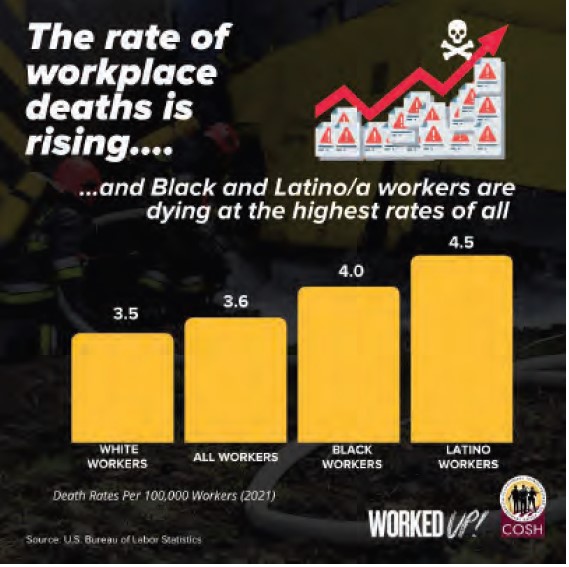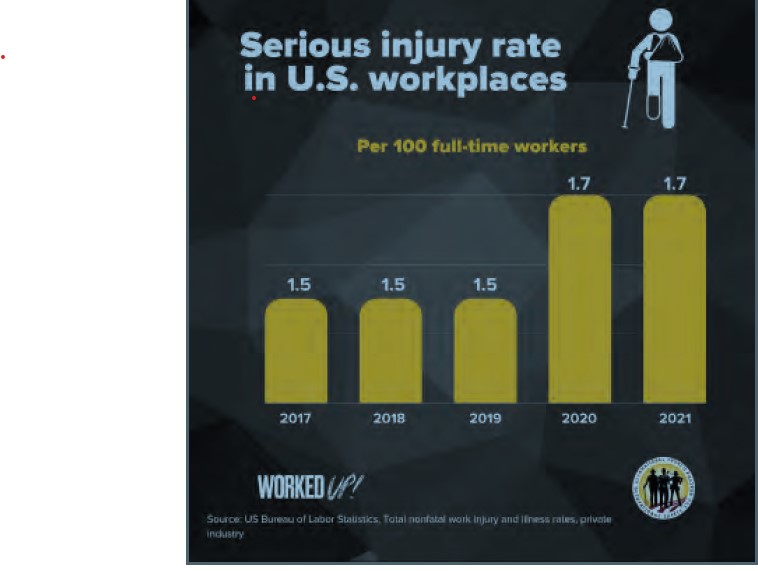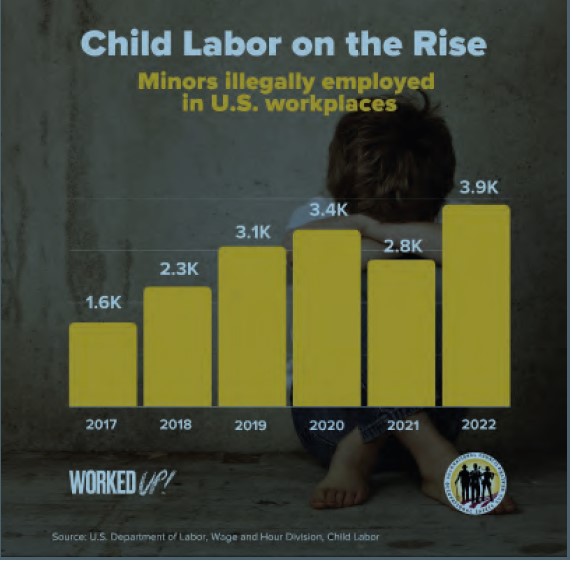EXECUTIVE SUMMARY
The National Council for Occupational Safety and Health (National COSH) releases the list of Dirty Dozen unsafe employers as part of our observance of Workers’ Memorial Week, which takes place this year from April 23 through April 30th.
This event, observed in the U.S. and worldwide, honors workers who have become sick, injured, or lost their lives on the job. We recognize as well the impact these preventable events have on family members.
The 2023 Dirty Dozen are companies which put workers and communities at risk due to unsafe practices. They are listed at below in alphabetical order.
Amazon Multiple deaths at Amazon warehouses in 2022, and citations at seven locations for exposing workers to hazardous conditions.
FedEx Three workers die at the shipping giant’s Memphis hub in 2022. Injuries and fatalities on the rise company-wide.
Hanover Company, Lithko Contracting, Friends Masonry Construction Three Latino construction workers die when scaffolding collapses on a Hanover project. Lithko Contracting cited nine times by OSHA, including one citation (now deleted) for a scaffolding violation.
Norfolk Southern and Class One Freight Railroads: BNSF, CSX, Kansas City Southern, Union Pacific, Canadian Pacific, Canadian National Railway Rail workers warn of safety problems long before the catastrophic derailment in Ohio. “Precision Scheduled Railroading” (PSR) cuts staff, reduces time for safety inspections and puts extra-long trains on the nation’s railways.
Occidental Chemical, Westlake Chemical There are 40,000 U.S. deaths each year from asbestos. Olin Corp., a major manufacturer, has endorsed an EPA ban; other chemical companies are still fighting this safety proposal.
Packer Sanitation Service Inc. (PSSI), JBS Foods, Cargill, Tyson More than 100 children found working illegally in high-hazard meat and poultry plants.
Sonoma WISE While growers fight back with aggressive astroturf tactics, California farmworkers win significant victories to counter health hazards due to climate change.
Swissport International AG Companies Workers exposed to raw feces and other unsafe conditions; company cited 35 times by OSHA for safety violations since 2013.
Tenet Healthcare Corporation Tenet staff say their employer cuts corners on safety. Since 2001, the company has paid over $1.8 billion in fines for false claims, bribery and kickbacks, health and safety and other violations
Tesla, Inc Worker testimony shows contractors passed out fake certificates instead of providing real safety training. Worker dies in 98-degree heat; company cited more than 170 times for safety violations.
Trulieve Cannabis Corp Truelieve worker dies from an asthma attack after inhaling cannabis dust. Company cited seven times by OSHA for safety violations.
Twin Peaks Restaurant So-called “breastaurant” chain has faced multiple claims of sexual harassment. Workers in Tennessee went on strike in January to protest physical and verbal abuse.
The Dirty Dozen are selected by the National COSH team, with nominations from our network of COSH groups, WorkedUp partners, workers, safety activists, union members, health and safety professionals and academic experts from across the country. Criteria include:
• Severity of safety risks to workers;
• Repeat and serious violations of safety standards and applicable laws;
• The position of a company within its industry and the economy and its ability to influence broader workplace standards;
• Presence of a campaign by workers and/or allies to correct health and safety problems.
ALARMING TRENDS IN U.S. WORKER SAFETY
Workers are standing up to win better conditions
Workers’ Memorial Week will be observed with rallies, vigils and other events to honor workers and their families. These gatherings are also an occasion to “fight like hell for the living” as we advocate together for safer working conditions.
There is an urgent need for collective action and stronger protections in our workplaces. Current conditions facing more than 160 million people in the U.S. civilian workforce include several alarming trends.
A total of 5,190 workers died from sudden workplace trauma in 2021. The rate of these workplace fatalities has increased since 2017.

Black and Brown workers still most at risk: Past and current discrimination, including a long history of assigning people of color to the dirtiest and most dangerous jobs, continues to impose a heavy cost on Black and Latino/a workers. These populations face a significantly higher rate of death from sudden workplace trauma than white workers, and higher than the workforce as a whole.
An estimated 95,000 workers die each year from long-term exposure to toxic substances and other workplace conditions3 —but U.S. chemical companies are still fighting a ban on asbestos, a leading cause of occupational cancer and other diseases.
We still don’t know how many workers died or are suffering from long-term illness from occupational exposure to COVID-19 The pandemic is far from “over” in health care workplaces and other settings where workers are exposed to COVID and other infectious diseases.

U.S. private sector employers reported more than 2.6 million workplace injuries and illnesses in 2021 This data, based on unaudited employer reports, severely underestimates the actual incidence of workers getting sick and hurt on the job.6 It can be used, however, to measure trends over time—and the latest statistics show that the rate of the most serious injuries has increased since 2017.
Child labor violations are increasing: The U.S. Department of Labor has documented a 140% increase in children illegally employed since 2017, many in hazardous occupations.7 Incredibly, some state legislators are responding to this dangerous situation by making it worse. In March, Arkansas Gov. Sarah Huckabee Sanders signed a bill to eliminate age verification requirements for hiring 15 and 16-year olds. A proposed bill in Iowa includes a provision that lets an employer escape legal liability if a child becomes ill, gets injured, or dies while participating in a “work-based learning program.”

HOW WORKERS AND ALLIES ARE FIGHTING BACK
• In response to increasing rates of injuries and fatalities and other dangerous conditions—as well as concerns about pay, scheduling, sick leave and other issues—workers are organizing to form unions at companies that previously had little or no union presence, including firms like Amazon, Apple, REI, Trader Joe’s and Starbucks.
• Workers know from first-hand experience that forming a union, which gives them a voice on the job and creates a level playing field with employers, is an important way to advocate and win safer, more secure working conditions. This experience is backed by empirical research, which shows fewer severe injuries and fatalities in unionized settings in the mining and construction industries.
• Last December, an act of Congress, signed by President Biden, prevented rail workers from going on strike to win paid sick leave. Paid time off for illnesses, injuries and medical visits is a key factor in helping workers stay healthy, reducing fatigue and keeping our nation’s railways safe. This year, rail unions have continued to negotiate with employers and have won paid sick leave in several contracts—although so far, not all workers are covered.
• Workers are also pursuing advocacy, legal and organizing strategies with assistance from COSH groups, workers centers and community-based organizations. As reported below, National COSH affiliate Workers Dignity in Nashville is supporting workers on strike at a Twin Peaks restaurant. Workers Defense is assisting workers at a Tesla site in Austin, and MassCOSH is part of a coalition advocating for safer conditions for cannabis workers in Massachusetts.
• Following successful advocacy by National COSH, local COSH groups and many partners and allies, OSHA has adopted new protections for immigrant workers. This includes issuing visa certifications so workers impacted by certain workplace crimes can remain in the US and contribute to the investigation.
• Climate change is a significant emerging threat to worker’s health and safety in both indoor and outdoor settings. Millions of workers are at risk from the effects of extreme weather, high temperatures, wildfire smoke, and other hazards. While working to win a nationwide federal heat standard, workers and advocates have made progress in states that have adopted heat safety regulations, including Oregon, Washington and California.
California’s Occupational Health and Safety Standards Board recently proposed a new standard to prevent heat illness for indoor workers.
National COSH and the member groups of the COSH Network will continue to support workers, families and allies in efforts to build power and win safer working conditions. Key steps include listening to workers, working together to adopt proven safety protocols and enforcing our safety laws. Employers are required by law to provide a workplace free from known hazards for all workers, regardless of age, gender, race or ethnicity. It’s vital to confront the discrimination and structural inequality which put some workers at greater risk, while also raising the bar to make every workplace as safe as possible.

Spread the word